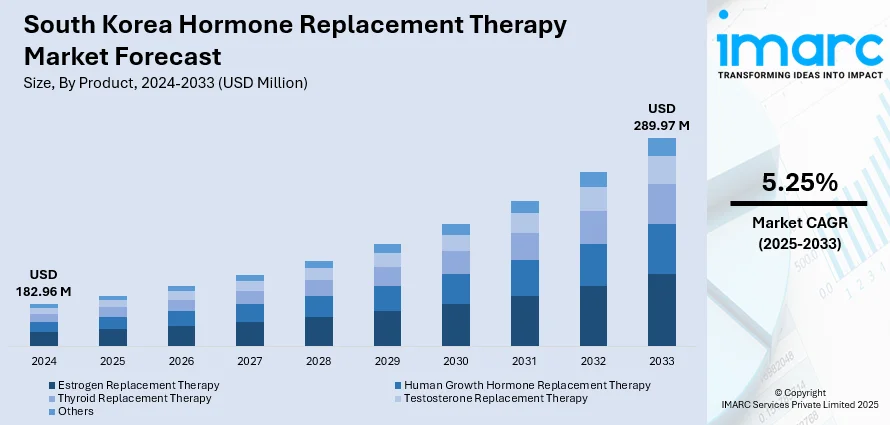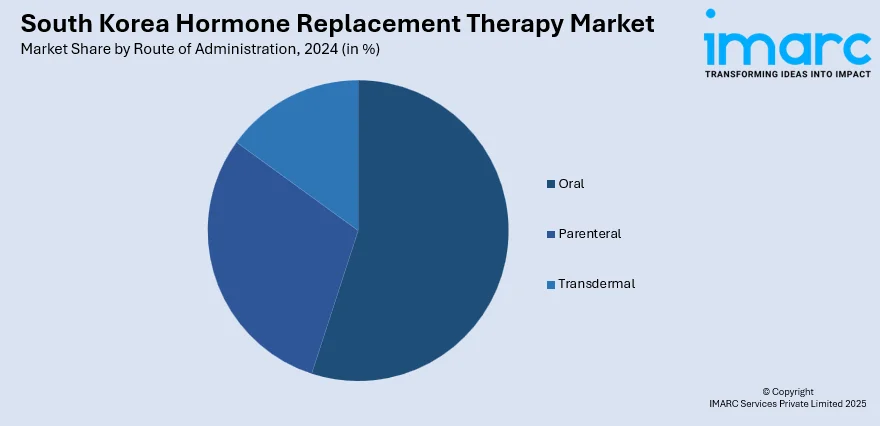
South Korea Hormone Replacement Therapy Market Size, Share, Trends and Forecast by Product, Route of Administration, Type of Disease and Region, 2025-2033
South Korea Hormone Replacement Therapy Market Overview:
The South Korea hormone replacement therapy market size reached USD 182.96 Million in 2024. Looking forward, the market is expected to reach USD 289.97 Million by 2033, exhibiting a growth rate (CAGR) of 5.25% during 2025-2033. The market is driven by increasing awareness about menopausal health, an aging female population, and rising demand for personalized healthcare solutions. Improved healthcare infrastructure and access to specialized gynecological services support wider adoption. The country’s advanced digital health ecosystem, growing interest in bioidentical hormones and government support for innovative therapies, further encourages market expansion. Pharmaceutical companies and biotech firms are also investing in research and localized product development to meet evolving consumer needs, which collectively strengthen the South Korea hormone replacement therapy market share.
|
Report Attribute
|
Key Statistics
|
|---|---|
|
Base Year
|
2024
|
|
Forecast Years
|
2025-2033
|
|
Historical Years
|
2019-2024
|
| Market Size in 2024 | USD 182.96 Million |
| Market Forecast in 2033 | USD 289.97 Million |
| Market Growth Rate 2025-2033 | 5.25% |
South Korea Hormone Replacement Therapy Market Trends:
Increasing Awareness and Acceptance of HRT among Women
South Korea has experienced a significant change in social perceptions concerning hormone replacement therapy (HRT), especially regarding menopause in the recent past. Increasing health awareness, which has been driven by comprehensive health campaigns, has prompted many urban women to seek aggressively treatments that mitigate menopausal symptoms such as hot flashes, mood swings, and sleep disruptions. More Korean women are investigating HRT alternatives via both the internet and obstetric/gynecological clinics, reflecting a cultural shift toward wellness-oriented interventions. The wellness- and beauty-oriented life in urban centers such as Seoul and Busan also fuel demand, with women valuing quality of life and sustaining good health. Metropolitan-area clinics now provide specialized menopause care programs that incorporate hormone therapy alongside lifestyle guidance, diet, and exercise. This holistic approach is part of a larger shift involving personalized, integrated care. Hence, with greater acceptance, HRT is becoming a mainstream option instead of a specialist treatment, shifting patient expectations and underlining the need for clinician education, which also contributes to the South Korea hormone replacement therapy market growth.

To get more information on this market, Request Sample
Integration of Personalized and Bioidentical Hormone Therapies
South Korea's hormone replacement therapy market is transforming to adopt personalized and bioidentical hormone formulations, customized according to individual hormonal profiles and patient needs. Top endocrinologists and gynecologists in city health centers are performing detailed hormone tests—assessing estrogen, progesterone, and testosterone levels—to create customized treatment plans. The increasing interest in bioidentical hormones, which are chemically identical to human hormones, indicates the confidence of Korean consumers in allopathic medicine when delivered through precision healthcare. Korean biotech companies are meeting this with the production of locally made bioidentical creams, gels, and oral formulations to match patient choice and minimize imports. Additionally, the pharmaceutical infrastructure in the country and strict regulatory control ensures high quality of manufacture. This regulatory environment fosters innovation through the easier conduct of clinical trials and has facilitated the expansion of CMO partnerships manufacturing customized HRT products. South Korean consumers, habituated to expecting high standards in terms of quality and safety, are therefore seeking comfort in customized solutions meeting their physiological and cultural requirements.
Digital Health Platforms and Telemedicine Driving Accessibility
A prominent trend in South Korea's hormone replacement therapy market is the emergence of telemedicine and online health platforms allowing HRT consultations and follow-up monitoring. South Korea has one of the highest rates of internet use and smartphone penetration, making it a perfect context for virtual healthcare services. Teleconsultations for menopause symptoms are convenient and discreet for many tech-first generation Koreans, particularly in geographically remote or time-scarce groups. Online platforms enable patients to upload biometric information, fill out hormone questionnaires, and get customized prescriptions—all without an office visit. These online advances are facilitated by government policies that recently extended coverage of telemedicine services, and by insurance programs that now partially cover virtual visits. Wellness apps are also providing symptom monitors and lifestyle guidance specific to hormonal health, as an adjunct to clinic visits. The outcome is an interconnected ecosystem in which digital and in-clinic services intersect to enhance continuity of care. For the HRT market, this translates to broader reach, improved adherence, and more educated patient participation, particularly with young menopausal women accustomed to digital-first healthcare experiences.
South Korea Hormone Replacement Therapy Market Segmentation:
IMARC Group provides an analysis of the key trends in each segment of the market, along with forecasts at the country and regional levels for 2025-2033. Our report has categorized the market based on product, route of administration, and type of disease.
Product Insights:
- Estrogen Replacement Therapy
- Human Growth Hormone Replacement Therapy
- Thyroid Replacement Therapy
- Testosterone Replacement Therapy
- Others
The report has provided a detailed breakup and analysis of the market based on the product. This includes estrogen replacement therapy, human growth hormone replacement therapy, thyroid replacement therapy, testosterone replacement therapy, and others.
Route of Administration Insights:

- Oral
- Parenteral
- Transdermal
The report has provided a detailed breakup and analysis of the market based on the route of administration. This includes oral, parenteral, and transdermal.
Type of Disease Insights:
- Menopause
- Hypothyroidism
- Male Hypogonadism
- Growth Hormone Deficiency
- Others
A detailed breakup and analysis of the market based on the type of disease has also been provided in the report. This includes menopause, hypothyroidism, male hypogonadism, growth hormone deficiency, and others.
Regional Insights:
- Seoul Capital Area
- Yeongnam (Southeastern Region)
- Honam (Southwestern Region)
- Hoseo (Central Region)
- Others
The report has also provided a comprehensive analysis of all the major regional markets, which include Seoul Capital Area, Yeongnam (Southeastern Region), Honam (Southwestern Region), Hoseo (Central Region), and others.
Competitive Landscape:
The market research report has also provided a comprehensive analysis of the competitive landscape. Competitive analysis such as market structure, key player positioning, top winning strategies, competitive dashboard, and company evaluation quadrant has been covered in the report. Also, detailed profiles of all major companies have been provided.
South Korea Hormone Replacement Therapy Market News:
- In May 2025, Daewon Pharmaceutical announced a strategic alliance with Bayer Korea to exclusively market and distribute two of Bayer’s hormone replacement therapies (HRT) in Korea. Starting June 2, Daewon Pharmaceutical will exclusively handle distribution, sales, and promotional efforts for both products, while Bayer Korea will maintain the supply of the medications. These treatments are recommended for alleviating symptoms of estrogen deficiency in women over a year after menopause and for preventing osteoporosis in postmenopausal women with a higher risk of fractures.
South Korea Hormone Replacement Therapy Market Report Coverage:
| Report Features | Details |
|---|---|
| Base Year of the Analysis | 2024 |
| Historical Period | 2019-2024 |
| Forecast Period | 2025-2033 |
| Units | Million USD |
| Scope of the Report |
Exploration of Historical Trends and Market Outlook, Industry Catalysts and Challenges, Segment-Wise Historical and Future Market Assessment:
|
| Products Covered | Estrogen Replacement Therapy, Human Growth Hormone Replacement Therapy, Thyroid Replacement Therapy, Testosterone Replacement Therapy, Others |
| Routes of Administration Covered | Oral, Parenteral, Transdermal |
| Type of Diseases Covered | Menopause, Hypothyroidism, Male Hypogonadism, Growth Hormone Deficiency, Others |
| Regions Covered | Seoul Capital Area, Yeongnam (Southeastern Region), Honam (Southwestern Region), Hoseo (Central Region), Others |
| Customization Scope | 10% Free Customization |
| Post-Sale Analyst Support | 10-12 Weeks |
| Delivery Format | PDF and Excel through Email (We can also provide the editable version of the report in PPT/Word format on special request) |
Key Questions Answered in This Report:
- How has the South Korea hormone replacement therapy market performed so far and how will it perform in the coming years?
- What is the breakup of the South Korea hormone replacement therapy market on the basis of product?
- What is the breakup of the South Korea hormone replacement therapy market on the basis of route of administration?
- What is the breakup of the South Korea hormone replacement therapy market on the basis of type of disease?
- What is the breakup of the South Korea hormone replacement therapy market on the basis of region?
- What are the various stages in the value chain of the South Korea hormone replacement therapy market?
- What are the key driving factors and challenges in the South Korea hormone replacement therapy market?
- What is the structure of the South Korea hormone replacement therapy market and who are the key players?
- What is the degree of competition in the South Korea hormone replacement therapy market?
Key Benefits for Stakeholders:
- IMARC’s industry report offers a comprehensive quantitative analysis of various market segments, historical and current market trends, market forecasts, and dynamics of the South Korea hormone replacement therapy market from 2019-2033.
- The research report provides the latest information on the market drivers, challenges, and opportunities in the South Korea hormone replacement therapy market.
- Porter's five forces analysis assist stakeholders in assessing the impact of new entrants, competitive rivalry, supplier power, buyer power, and the threat of substitution. It helps stakeholders to analyze the level of competition within the South Korea hormone replacement therapy industry and its attractiveness.
- Competitive landscape allows stakeholders to understand their competitive environment and provides an insight into the current positions of key players in the market.
Need more help?
- Speak to our experienced analysts for insights on the current market scenarios.
- Include additional segments and countries to customize the report as per your requirement.
- Gain an unparalleled competitive advantage in your domain by understanding how to utilize the report and positively impacting your operations and revenue.
- For further assistance, please connect with our analysts.
 Request Customization
Request Customization
 Speak to an Analyst
Speak to an Analyst
 Request Brochure
Request Brochure
 Inquire Before Buying
Inquire Before Buying




.webp)




.webp)












